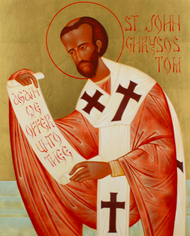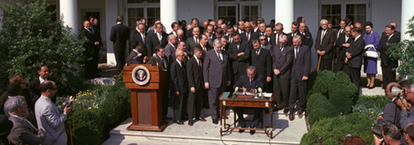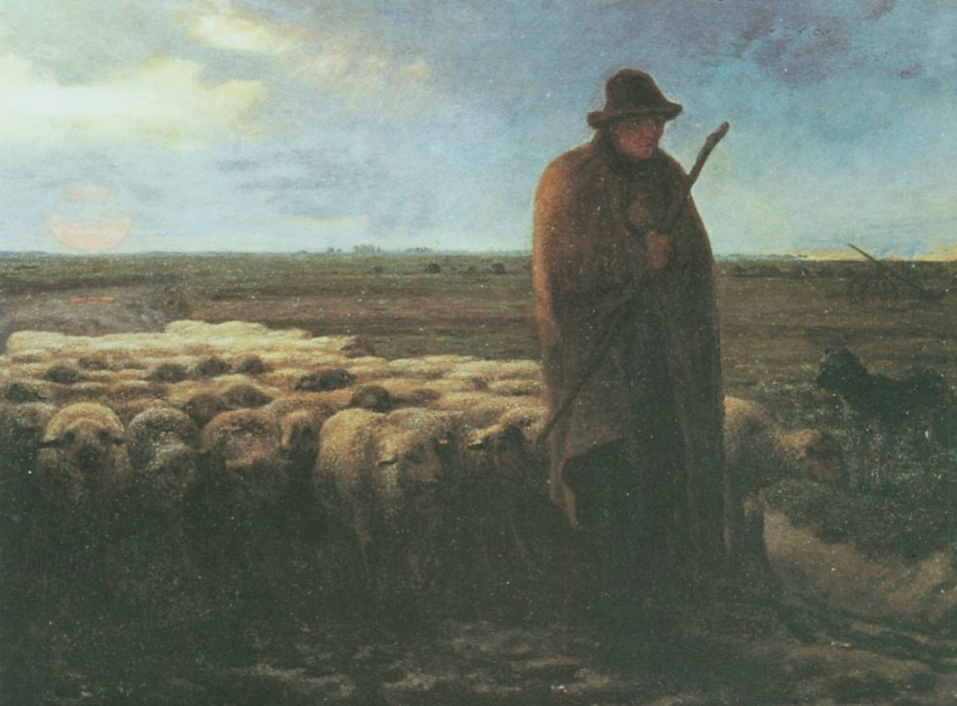 Reading a book this morning called, Congregations, Neighborhoods, Places by Mark T. Mulder and he hits me with John Chrysostom quote . . . so I go look up the full quote from the source, which turns out, interestingly enough from his 21st homily on 1 Corinthians (which, by the way, offers a far better reading of the table issue in 1 Corinthians 10-11 than how we back into it from our boxed-church, contemporary church-leadership, and church-service practices of today, but I digress). What Mulder quotes is pretty powerful all by itself, but after reading the whole Chrysostom thought, I am, again, left undone . . . how do we escape the foolishness and public madness of our overabundance? The whole Chrysostom quote:
My rendering of the last line from the Chrysostom quote, yet, with a contemporary application: “And do you not think of how you must give an account of your use of your overabundance of God's gracious gifts [to you]?”
As the golden mouth preacher (the meaning of his name, bytheway) put it, but with my spin: It is foolishness and a public madness to fill our cupboards with clothing, garages with cars, bank accounts with money, our lives with toys, and allow men who were created in God’s image and likeness to stand naked and trembling with the cold so that they can hardly hold themselves up right.
0 Comments
Some preparation for this coming Sunday’s teaching/sermon and some exegetical fun with Ephesians 4:11 (for those that like this sort of thing)
Elsewhere in the New Testament (and in Greek literature in general), when a writer strings words together, that is creates a run-on list of related words (cf. Ro 12:2; Phil 4:6), the sense is to describe the same thing, that is one thing. So what we have, here with Paul in Eph 4:11, probably should be taken in the manner of other similar Greek stringing to emphasize “teachers” of the church—“the prophets and the evangelists and the shepherds” (noting and leaving in the repeated use of the definite article, “the” (τοὺς) that is left out of many English translations). The καὶ (and) that precedes the word διδασκάλους (teachers) should, most likely, be read epexegetically, that is with the meaning “namely” or “that is” (in this case because of the string of words, “namely that are”). The “teachers,” then, explain the nature and give summary (the point) of the previous string of words, “the prophets and the evangelists and the shepherds.” Most older English translations mask the obvious string by inserting the word “some” before each office. The NIV and ESV give the sense of the original (Greek) by showing the definite article that is used (τοὺς, the) before each in the string. The exception is with διδασκάλους (teachers); there is no preceding definite article. Some (I used to) just take the lack of an article to be linked solely to “the shepherds” (τοὺς δὲ ποιμένας καὶ διδασκάλους)–i.e., shepherds that teach; yet there is good sense to see the whole string (which is very reasonable and most likely) to be in the frame of the epexegetical phrase καὶ διδασκάλους (namely, that are teachers). Thus, my reading: “the prophets and the evangelists and the shepherds, namely [καὶ], that are teachers.” This makes grammatical and syntactical sense of the string and the repeated definite articles, and the lack of article with “teachers.” (See below* regarding my comment on the μὲν . . . δὲ construction, on the one hand . . . and on the other). We should read Ephesians 4:11: “God gave, on the one hand (μὲν)* apostles [who set the foundation of apostolic teaching and traditions (cf. Acts 2:42)], yet (δὲ) on the other hand, [He gave] teachers that speak-forth the Word (i.e., prophets), that proclaim and spread the good news (i.e., evangelists), and that guard, protect, feed (instruct/disciple), and care for the flock (i.e., shepherds).” I believe, given the wording and syntax of this verse, what I propose here is a fair and faithful reading of Paul’s intention for writing this to the church in Ephesus. The “apostles” are foundational in that they, historically, passed on (i.e., Peter, John, James, et al.) or delivered (e.g., Paul, Barnabas, et al.) the apostolic traditions (i.e., the teachings of Jesus and their intentions) at the first as churches where planted and spread throughout the known world. On the other hand, “the prophets and the evangelists and the shepherds” are the “teachers” that continue to pass-on apostolic tradition/teaching to the gathered-believers (or local churches) as the word spread and took root geo-demographically. I take the first office (“apostles”) as temporary once for all time and the second set of offices (and if you don't like the word office, “roles,” then, works just fine) as teachers for the gathered-churches to cause unity, maturity, and growth throughout time until . . . the word Paul uses (4:13) . . . until the fulness of Christ is accomplished in time and space on planet earth (cf. 1:10; 22-23; 3:19; 4:13c). In the rest of the paragraph (Ephesians 4:12-16), we will learn that these people—note: I take these more so as offices (or, again if you prefer, roles) filled by people (who are able and/or appointed to pass on apostolic teaching) because, rather than using a relative pronoun, i.e., those who prophecy/forth-tell, who evangelize, and who shepherd, Paul is intentional in using the definite article (τοὺς, the) before each word—they are given (i.e., gifts) to God’s people to move them toward the unity of the faith and the knowledge of God’s Son, toward perfection (i.e., maturity), and toward the fulness of Christ (that is being church, which is His body in locales, scattered throughout the earth, i.e., churches). At CPC in The Hill, we have, for a number of weeks, heard in the Gospel of Matthew about Shepherds and God expecting that teachers were to carry on the work of the ministry in the church. We noted that sheep die without shepherds (cf. Matt 9:35-38). We have heard about bad/poor/false leaven (i.e., teaching) and that we must take serious the instruction of a cross-centered teaching (Matthew 16 for example). So, our little detour in Ephesians this coming Sunday isn’t all that much a detour. Note Paul's link to shepherds in Ephesians 4:11.We will be discussing the need, significance and importance of developing teachers at CPC in The Hill. *μὲν is usually not translated, however, the μὲν . . . δὲ construction should be understood as “on the one hand . . . and on the other,” thus my translation. Furthermore, each δὲ in the string strengthens the reading that each office/role is included with the epexegetical καὶ (namely, that are).
I hadn’t even glimpsed at Newbigin for background and resource when I was writing my Wasted Evangelism. Apparently I should have. I wrote Wasted Evangelism, first and foremost, as an exegetical journey (in the Gospel of Mark). And, I did so from a social action platform (the sphere in which, at the time I had been employed for eighteen years), which directed much of my research (beyond my exegesis), bibliography, and thought process. I did not write, necessarily, from an ecclesiological platform—although that was never far from my mind (which you can tell from reading the book). And, neither was Newbigin far from my developed thought, really, for I had been reading his work throughout my discipleship journey years before I began Wasted Evangelism. What is so significant about Newbigin (for me now) is his ecclesiological center. To separate such grand observations of social action from Newbigin’s ecclesiology is to read him wrongly; furthermore, to detach his view of social action from church, God's alternative social group in contrast to the rest of the world, is to miss his point entirely. This is where I am at now in my own journey: that the church (and I prefer you reading, a church) is an alternative to the social and cultural groups and associations known and experienced in the world, the locus of mission; and, as such, we should understand that biblical social action is a component of its evangelism (the very argument of my book). Thus, biblical social action is an element of the church’s nature, not an add-on or a hopeful by-product of some of the individuals who can do social action or make systemic changes from their place in society and/or their vocation getting saved, or as an “optional extra” as Newbigin puts it. Many Christian social justice leaders and activists separate social action from the life of church (a church, again) as if it is merely a church-state confrontation or a public sphere activity of Christians and Church-like groups. Most conservative-leaning Christians see social action as a by-product of salvation, but still a distraction from the church’s real center, “eternal salvation.” Both misunderstand Jesus. Both misread the gospel. Both err toward what they want to protect theologically or promote politically. The former has a thin view of church. The latter has a thin view of the gospel. Newbigin affirms my own view of Wasted Evangelism and helps me to place it where social justice belongs: church (and again, please read here, a local-gathered-church).
*If you are interested, please checkout my Wasted Evangelism: Social Action and the Church's Task of Evangelism for all the royalties go to our church planting and ministry in the Hill. You may also support the church plant and ministry itself by giving a donation through our website >> CPCinTheHill.org
 The systems (by design, default, and/or from unintended consequences) that are in place that create and sustain the conditions of poverty and our current social structures are near impossible to change. All the political and progressive rhetoric is ill-equipped to actually offer alternatives to the current conditions of poverty. Social boundaries, the ability for mobility (cultural, social, educational, economic, et al.) are mostly set in concrete, near unchangeable. Furthermore, those who have a vested interest in their own place and status (wealth, social, location, power) have no, sincere, vested interest (beyond appearance, mere rhetoric, or progressive voting) in changing the systems now in place. On the other hand, those in the bottom demographics do not have the power, do not live in geographic spaces, nor have the educational skills to make any significant change to the very complex, hierarchical-engendering, boundary rich, mobility disabling systems in place that keep most everybody in their social, economic, and cultural corners (socially, geographically, demographically, educationally, et al.) The spheres of government and of social-service (private and public) do not have the truly vested, self-less interests in making change. The appearance of change, perhaps. The rhetoric of change, perhaps. The political allegiance, perhaps. But not real, systemic changes that would actually release mobility beyond the current “corners.” When will we learn this, O Christian? Yet, as strange, foreign, and impossibly crazy as this sounds, the only space where the good life, flourishing, and even systemic social and cultural change to offer real mobility beyond our current “corners” or even truly be imagined is the gospel-rich church–literally amid local churches scattered throughout communities. Amid local churches where there is no earthly power being sought (even by its leadership), but the love of neighbor (and neighborhoods). Amid local churches where an individual’s humanity is honored, prized, and even died for is a result of believing in the gospel of Jesus Christ. This is the space, amid the early church, in which such change was nurtured and, albeit slowly, happened at the heights of the Roman empire. Where it actually outlived an empire. This is the space in which such changes have happened on small and large scales ever since. Where all lives literally matter; and, when there are lives deemed lesser, treated lesser, those lives matter more, intentionally more. The space where the hierarchies of tiered humanity are deconstructed and the alternative is constructed–that alternative is the kingdom of God, realized in Christ Jesus, and revealed through the church (literally through churches scattered in countless neighborhoods and communities). In the social and governing spheres where it takes power to make systemic changes, it will also take power to maintain such changes. And, this maintaining power is always violent. Furthermore, human nature (in the church we call it our sinful nature) will not, however, relinquish its desire for maintaining one’s advantage over others and freely disinvest its self-interests on behalf of others. So once systemic changes are make (where there is power to make such change), there will always be the powerful and powers that will seek to mark their place and status (i.e., those who make the laws have the power to enforce, by means of violence, their laws); also, there will always be those who obtained newly created social elite status, those who become affluent because of the changes and, then, will seek systems to exercise power (political and social) to maintain the new status quo (their new power). Thus, the boundaries remain and the violence to maintain them continue. This is not the way of the gospel; and, thus, not the nature of the church (read local churches scattered among communities, neighborhoods, regions). This is why the local, gospel-centered, gospel-rich, gospel-dependent, gospel-lived church is the only real space where such social change can truly be experienced. Church matters (#churchmatters). |
AuthorChip M. Anderson, advocate for biblical social action; pastor of an urban church plant in the Hill neighborhood of New Haven, CT; husband, father, author, former Greek & NT professor; and, 19 years involved with social action. Archives
February 2024
Categories
All
|
Pages |
More Pages |
|


 RSS Feed
RSS Feed